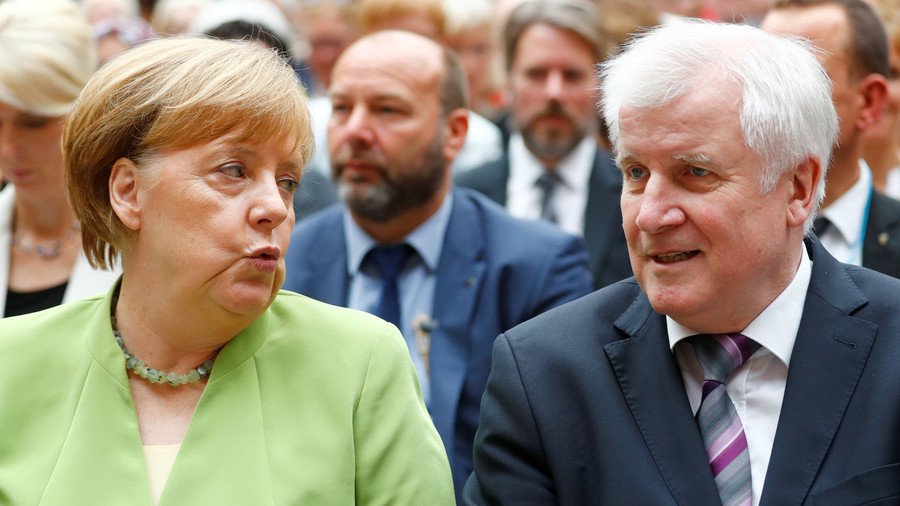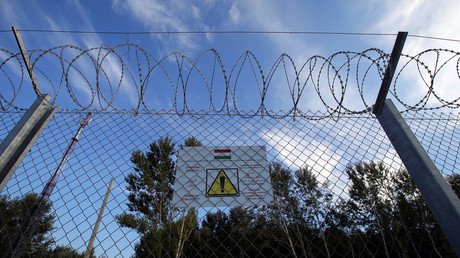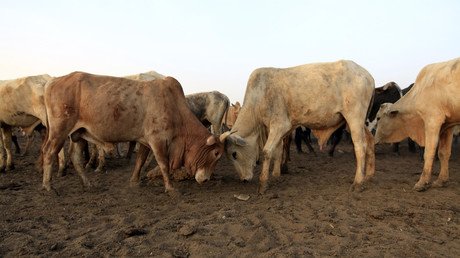Merkel reaches deal with sister party head over immigration after days of standoff

The political crisis in Germany seems to have been averted, as the ruling coalition reached a “sustainable solution” on illegal migration, according to German Interior Minister Horst Seehofer, who has agreed not to resign.
“After intensive discussions between the CDU and CSU we have reached an agreement on how we can in future prevent illegal immigration on the border between Germany and Austria,” he told reporters late on Monday, leaving the CDU's Berlin headquarters.
Seehofer, who is also party leader of Germany's Christian Social Union (CSU) in Bavaria, said that he will continue serving as interior minister, after the two conservative parties reached a clear agreement on how to handle migrants.
It comes just one day after reports emerged that Seehofer, who threatened to use his power to turn away migrants at the German border, allegedly said that he'd rather resign than give in to Merkel, who is adamantly against turning away new arrivals.
Merkel has also confirmed that a good compromise was reached, with her party's chairwoman, Annegret Kramp-Karrenbauer, saying the deal will prevent migrants registered elsewhere from entering Germany. The German chancellor also said that transit centers will be established in Germany which will return migrants to the European countries from which they arrived.
In addition to transit centers, there will be a new border regime at the Germany-Austria border to ensure "that we prevent asylum seekers whose asylum procedures are the responsibility of other EU countries from entering the country," Deutsche Welle reported.
"I am glad that this agreement has been reached. It has once again become clear that it is worth fighting for a conviction. And what follows now is a very sustainable and clear agreement for the future. The agreement meets my expectations on all three points," Seehofer said after agreeing to the deal.
Reaching a deal and appeasing Seehofer was extremely important for Merkel. If Seehofer would have resigned, Merkel would have no longer had a parliamentary majority and new elections would have been held.
Seehofer was unhappy with the deal from the summit and maintained his stance that migrants should indeed be turned back at the border. He complained that, ahead of the meeting, he had taken part in a "conversation with no effect" with Merkel, who, according to him, came back with an unacceptable compromise.
"In the interest of this country and the capacity of this government, which we want to maintain, we want to make an attempt to find an agreement on this central question of turning people away [at the German border]," he said on Monday. "Everything else will be decided afterward."
The deal that Seehofer was displeased with was incredibly vague and, despite Merkel claiming she had received "political consent" form 14 EU nations to strike the deal, three countries – Hungary, Poland, and the Czech Republic – said they had never agreed to such a deal.
That agreement from the summit didn't mention many concrete specifics but did state that members of the European Union would be able to set up "control centers" for "rapid processing" on a completely voluntary basis. It also said that the fight against people-smugglers should be ramped up, that Europe should continue to expand cooperation with Turkey and Africa when it comes to migration, and that the European border and coast guard agency FRONTEX should be strengthened.
















